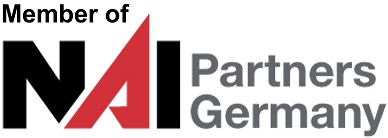NAI apollo: Transaction market for residential portfolios registers weakest nine-month result since 2011
Frankfurt am Main, 4th October 2023 – The German residential portfolio transaction market still failed to gain any significant momentum in the third quarter of 2023. According to an analysis by NAI apollo, partner of the NAI apollo group, residential portfolios in Germany were traded for over €1.4 billion in the past three months. This represents the second lowest quarterly result after the previous quarter (Q2 2023: €1.3 billion) of the last twelve years. The result in the year to date result amounts to around €4.7 billion as autumn gets underway. The last time a weaker result was registered for the first nine months was in 2011. As expected, the figure is well below both the result of the previous year (Q1-Q3 2022: €10.2 billion) and the recent five-year average (€15.2 billion). “There continues to be an absence of large-volume deals, although this is also not surprising in view of the current complex constellation of different factors. The European Central Bank raised the key interest rate to 4.5 % in September. This further complicates pricing on the property transaction market and drives up financing costs,” said Dr Marcel Crommen, Managing Director of NAI apollo.
"However, certain market-stabilising factors are still in place. Rents are rising for both old and new properties amid an increase in surplus demand on the rental markets, further supported by essential investments in energy-efficient refurbishments as well as upgrades of rented accommodation. This will continue in the coming months. The potential for rent increases is even more important for investors in view of falling purchase price factors, as this contributes to the stabilisation of capital values," added Dr Konrad Kanzler, Head of Research at NAI apollo.
Deals in the €100m-€500m segment account for the highest market share; investments in small deals increase 13.5 %
The number of transactions so far in 2023 has fallen by 50 % compared to the previous year. In total, around 25,800 residential units changed hands in the past nine months. Limited investment activity in the large-volume segment is the primary cause of the low overall volume. Only one large transaction above €500 million has taken place so far, namely the sale of 1,350 new residential units by Vonovia to CBRE Investment Management in the previous quarter, giving this price category the second highest market share of 11.9 %. Although the €100m-€500m segment accounts for the largest share of the volume at 44.5 % (+4.4 percentage points), the traded volume here almost halved in absolute terms to €2.1 billion compared to the previous year. Sales in other segments also declined by 50 % to almost 80 %, with one exception: smaller deals below €10 million exceeded the previous year's result by 13.5 %.
Sales revenue from project developments fall by almost 80 %
“The current crisis has the project development market in particular in its grip. Sharply increased interest rates combined with high construction costs have brought the bulk of new construction and conversion activities to a standstill,” said Stefan Mergen, Managing Partner at apollo valuation & research GmbH. As a result, new construction activity and trading in project developments have decreased. The transaction volume generated by forward deals has fallen to just under €1 billion at the start of autumn 2023 compared to €4.6 billion in the same period last year. The third quarter contributed only around €230 million to this volume. “Newly built properties are still on investors’ shopping lists, but the costs are very high. As project developments become more expensive, investors’ attention is being drawn more to existing, ESG-compliant residential units in the core and core-plus segments. At the same time, there is also interest in portfolios in the value-add and opportunistic risk classes, which offer particular potential for value enhancement when implementing manage-to-green strategies,” said Crommen.
Asset Managers and Funds Managers remain the dominant buyers, while Listed Property Companies and REITs are the strongest sellers
Since the beginning of the year, “Asset Managers and Funds Managers” have played a dominant role on the buy-side with a current market share of 28.3 % or €1.3 billion. They are followed by “Open-Ended Funds and Special Funds” with 18.9 % (€890 million) and “Property Companies” with 17.4 % (€820 million). “The Listed Property Companies, which stood out in previous years owing to their large portfolio purchases, are currently only engaged in sales activities. Accordingly, Listed Property Companies and REITs have further consolidated their leading position on the sell side with a sales volume of almost €1.7 billion or a market share of 35.9 % over the course of the year,” said Kanzler.
In terms of investor origin, domestic investors remained the dominant players on the German residential portfolio transaction market in the first nine months of 2023. In absolute terms, however, their investment volume halved from €7.3 billion to almost €3.6 billion compared to the previous year. This corresponds to a market share of 75.5 %, which is 4.1 percentage points higher. Correspondingly, the share of foreign investors has fallen to 24.5 %. In absolute terms, the purchase volume of international investors fell 60.6 % to around €1.2 billion.
Price expectations between buyers and sellers are converging, but a market recovery is still not in sight
“The overall economic mood in Germany has deteriorated further. As a result, many market players have further scaled back their investment plans or are proceeding very selectively, also owing to the growing importance of sustainability aspects. Some sales have recently taken place primarily to secure liquidity, especially on the part of Listed Property Companies and Project Developers,” Mergen said. “The situation will remain uncertain for a few more months, even if investors are increasingly coming to terms with the new reality. Market prices have not yet bottomed out, but price expectations between market participants are converging. The current price downturn may represent an opportunity for long-term equity investors. In addition, an increase in forced sales is to be expected. At the same time, various property companies continue to pursue larger portfolio sales,” added Crommen. In the short term, however, this will not lead to any significant market revival. The further development of the overall economic situation as well as construction and financing costs will remain decisive. We can only expect the market to pick up momentum when there are at least some signs of stabilisation.

